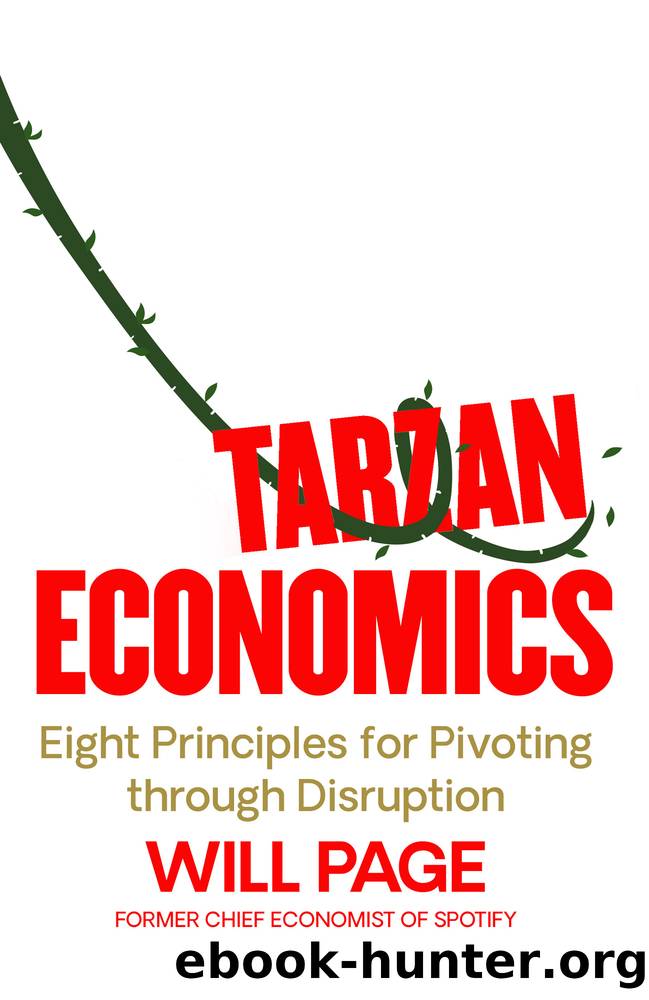Tarzan Economics by Will Page

Author:Will Page
Language: eng
Format: epub
Publisher: Simon & Schuster UK
Published: 2021-04-02T00:00:00+00:00
* * *
Alison Wenham, the former chairman and CEO of the Association of Independent Music, stood on a stage at a CISAC conference in Brussels in 2007 and said: âCollective licensing is best described as either capitalism with a touch of communism, or communism with a touch of capitalism.â She may have upset many in the audience for making this point but itâs a profound observation. It often pays to act in the common good of a collective and not solely in oneâs self-interest.
Clubbing together into a collective may hark back to communism (with a touch of capitalism) but clearly it can be made sustainable. Conversely, extracting that added premium for the convenience of the blanket licence is capitalism, but it is only possible with a touch of communism that comes with the collective. For the many individuals, firms and institutions grappling with Tarzan Economics, I truly believe they will find solace in rebalancing communism with capitalism, or capitalism with communism.
Letâs return to the woes facing the newspaper industry outlined earlier and consider how a touch of communism may help the fragilities of the traditional newspaper model. We know that some journalists are valued more than others, which can result in Groucho Marxism, and that paying per article would lead to gridlock when trying to access news. We also know that news, like music, wants to feel free â you donât know youâre paying for music while drinking a glass of water in a cafe, and the fact you donât makes it more enjoyable â the collective has settled the bill backstage.
If news wants to be free but the journalist needs to be paid, revisiting collective solutions can help find a way out of the sinking sand that newspaper titles have found themselves in for the past decade. If the Guardian or the New York Times on the left of the political spectrum, or the Telegraph or the Wall Street Journal on the right, were to toss their respective hats into the collective ring, they could benefit from acting in the âcommon goodâ â developing shared advertising platforms and exploring collective licensing and distribution of all their journalistic output.
Collectives may not make sense to the minority of consumers who currently pay for news, but they may chime with the majority who donât. A lost reader â someone who used to pay the cover price of a newspaper â may not be willing to pay for that same newspaper title behind a paywall but more than happy to pay a blanket fee for all. This poses a dilemma: the paper values its current realised value of its journalistic output, but that lost reader might have a higher actuarial value on the option to explore other forms of journalism. The Athletic website, a US-based collective of the worldâs best sports journalists plucked from the payroll of broadsheet newspapers, is already putting this into practice â forming a club that even Groucho would want to become a member of. Aggressive price-discounting, with monthly
Download
This site does not store any files on its server. We only index and link to content provided by other sites. Please contact the content providers to delete copyright contents if any and email us, we'll remove relevant links or contents immediately.
International Integration of the Brazilian Economy by Elias C. Grivoyannis(100253)
The Radium Girls by Kate Moore(11980)
Turbulence by E. J. Noyes(7986)
Nudge - Improving Decisions about Health, Wealth, and Happiness by Thaler Sunstein(7665)
The Black Swan by Nassim Nicholas Taleb(7067)
Rich Dad Poor Dad by Robert T. Kiyosaki(6527)
Pioneering Portfolio Management by David F. Swensen(6263)
Man-made Catastrophes and Risk Information Concealment by Dmitry Chernov & Didier Sornette(5961)
Zero to One by Peter Thiel(5741)
Secrecy World by Jake Bernstein(4709)
Millionaire: The Philanderer, Gambler, and Duelist Who Invented Modern Finance by Janet Gleeson(4427)
The Age of Surveillance Capitalism by Shoshana Zuboff(4256)
Skin in the Game by Nassim Nicholas Taleb(4210)
Bullshit Jobs by David Graeber(4146)
The Money Culture by Michael Lewis(4145)
Skin in the Game: Hidden Asymmetries in Daily Life by Nassim Nicholas Taleb(3965)
The Dhandho Investor by Mohnish Pabrai(3730)
The Wisdom of Finance by Mihir Desai(3701)
Blockchain Basics by Daniel Drescher(3545)
